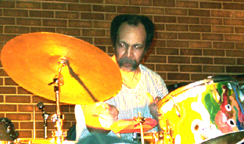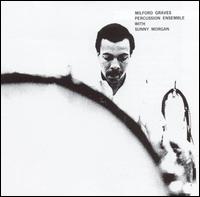
A FIRESIDE
CHAT WITH MILFORD GRAVES
If
you like the "free jazz" or "avant-garde" or "loft"
or "downtown" or whatever other bullshit name they give this
music, you are a fan of Milford Graves. You may not know it, but you are.
Much like Henry Grimes, Graves is one of those musicians that those in
the know, know and those in the, well, not know, don't. Albert Ayler's
Love Cry, that's Graves. The killing ESP sessions, New York Art Quartet,
Barrage, Giuseppi Logan Quartet, and Lowell Davidson Trio, that's Graves.
And Sonny Sharrock's Black Woman, you get the picture. I was honored to
speak with Graves, a musician I have long admired and never lived long
enough in New York to see live. Folks, Milford Graves, unedited and in
his own words.
FRED
JUNG: Let's start from the beginning.
MILFORD
GRAVES: I had no special reason. From a talk with my parents, I was probably
around two or three years old when I started hitting a drum. The drums
were in the house and I tried to figure it out over the years, why did
I enter music and why did I play the instrument that I play and I really
can't come up with anything that would give me a definite reason why,
other than that's what I was put on the planet to do.
FJ:
Every child, at some point or another, plays drum hands, but only a very
diminutive minority take up the art.
MG:
I was in junior high school and I was playing for the assembly programs.
I was asked to play for the special events that we had at our school.
I formed a drum group and we had some dancers. We called it interpretive
dancing at the time, but they were actually trying to do African dance.
I realized that there was something happening when I would be playing
before a bunch of my friends in an auditorium and that is when I started
realizing it and started to get serious.
FJ:
When did you begin studying the tabla?
MG:
I started learning tabla in 1965 and I studied with Wasantha Singh.
FJ:
Apart from aesthetics, what are the differences between a tabla and a
conga?
MG:
First of all, it is the make of the drum itself. The tabla is a much smaller
instrument compared to the conga. The tabla is also played with each individual
finger. You can do that with the congas too, but the congas really play
with all the fingers really hitting at the same time. With tabla, the
fingers are hitting at individual, different times. It is a sequence you
do with each finger. The way that the tabla is made allows you to manipulate
the skin to get these different kind of tonal properties out. That is
really the big difference. I have a certain kind of personality when I
play tabla and a certain kind of personality when I play conga.
FJ:
Talk to me about your collaborations with the New York Art Quartet.
MG:
That group started before me. I met that group in 1964. They had already
had a group and J.C. Moses was the drummer before I was in that group.
I met Roswell (Rudd) and John Tchicai through Guiseppi Logan and Guiseppi
Logan asked me if I would like to a rehearsal of the New York Art Quartet,
that he had met one of these guys and they invited him to a rehearsal
and he told me to come along. The rehearsal was at a loft that was owned
by Michael Snow, who is a Canadian artist. We went there and they played
and asked Guiseppi if he wanted to sit in because he brought his alto
saxophone. So he played and then he asked Roswell and John if I could
play and then I played. J.C. Moses had left and they listened to the tape
because they recorded the whole session and said that they liked what
I was doing and if I would like to be the new drummer and that was it.
John Tchicai is no longer a member of that band. At the present time,
John Zorn is playing with the band. John Tchicai decided it was time for
him to leave the band.
FJ:
Guiseppi Logan is a free jazz urban legend. Is Logan dead or alive?
MG:
Well, the reports that I've received is that he is still alive. He was
spotted up in Harlem, New York. That's what people say. I don't know.
I was approached to go up to Harlem to seek him out. Somebody spotted
him in a hotel on 125th Street and I haven't had the opportunity to do
that. Someone said they saw him, but I don't know. I wouldn't say that
he is still alive. That was the latest on him. I last saw Guiseppi Logan
in the Seventies and he wasn't in good shape. He was in the streets. He
is a question mark whether he is still alive. Hopefully, he is. I was
the one who told Bernard Stollman (founder of ESP) about Guiseppi Logan.
I met Bernard Stollman through the New York Art Quartet. He wanted to
record me and in turn, I told Guiseppi that I have some time because I'm
a young guy and instead of me taking this record date and being the leader,
I gave him the record date and so he took the record date. It was 1965
when we did that together.
FJ:
And your work with Albert Ayler, who has in death become an underground
superhero.
MG:
Unfortunately, some people are afraid to talk about somebody when they
are dead. I have no problem with that because I think it is important
to educate people about mistakes that people made so they won't make those
mistakes. I thought the positive things in him was that he was dedicated
to what he did. I think that is one of the big positive things. He didn't
talk so much. He hummed a lot. He was constantly humming. His playing,
the way he played was quite different from him as a person. His playing
was more aggressive in volume. He, as a person, was not like that. I think
his spiritual side didn't allow him to be aggressive enough when it came
to taking a certain kind of business stance. The reports that I've had,
knowing a little bit about Albert, I think he kind of regretted some of
the things that he allowed himself to get involved with, his last entries
with Impulse! Records. When he was told what kind of band he should have
and what kind of music he should do. He didn't survive a lot of his errors.
It really affected him. I actually saw the official coroner's report.
The rumors that he had been murdered and he had been shot in the head,
well, as far as the New York City coroner's report, there was no indication
of that.
FJ:
He simply drowned.
MG:
Yeah, that is what the report read.
FJ:
Do you believe that report to be true?
MG:
I think so.
FJ:
Why have you not recorded more?
MG:
I think I would record more if people would understand that I have a telephone
and that I have a mailing address. If they understood that, then maybe
we could talk a little bit. When you record, people have to realize that
serious musicians make a great sacrifice and you are going to give up
your art sometimes. You have to help support us a little bit. Some artists
are fortunate, they get what they ask for.
FJ:
What is a typical Milford Graves day?
MG:
I spend my time at Bennington College doing research on sound and holistic
healing and how the body functions and circulatory system is involved
with our basic internal music structure. That is primarily what I do.
FJ:
Is there a direct correlation between what a person listens to and his
or her health?
MG:
Oh, I think so and hopefully, I'll have a very good book or report on
that very soon. I will tell you what is very interesting. I always tell
people that being a musician is extremely important and if you are going
to be a musician, you have to be responsible because people come to listen
to you. You go to a restaurant to get some food and you depend on that
chef or that cook to prepare some food that is not only going to taste
good, but also be healthy to you. People come to see musicians with their
ears. They are using their ears and asking you to put something in their
ears. You have to know what you are putting in their ears. In traditional
times, a musician was required not only to know the instrument, but they
were also doctors, healers. You never separated those two because you
are dealing with people. You are dealing with the mind. You are dealing
with bodies. You are dealing with the soul. When you try and separate
those things, it is no good. Other than the physical thing, you have to
have some internal content. You have to have some mind stuff. The only
way you are going to get mind stuff is to know about people. You have
to know how people live. You have to know about culture, not only your
own culture, but the whole multicultural concept because you are dealing
with a multiplicity of people. Therefore, I tell them the importance of
what a drummer is. Those guys over there, especially the Griots, they
are the storytellers. So the more stories you know and the more you know
about life, the more you can articulate on that instrument, especially
if you know the relationship between the word and the drum. What I impart
to them is to not only be some musician, who just blows through an instrument,
pluck, or hit on a drum skin, you have to be a good person and what being
a human is about. Tell your story on an instrument.
FJ:
Sixty plus years on this earth, it's a good bet you have stories aplenty.
MG:
I have a bunch of them.
FJ:
Are kids these days missing out being as musically dogmatic as they are?
MG:
I know. I had this discussion the other day at the college. Today, people
come from all parts of the world and you can't impose just the way you
have been taught, this so-called American way you have been taught, whether
you want to call it Anglo or a white man's way of doing something. You
have to understand that other people have something to contribute.
FJ:
What is the most unique instrument you own?
MG:
The human voice. You can't beat it. For me to do a drum solo, my voice
has to be in there.
FJ:
Who do I need to have a sit down with to get you to LA?
MG:
I have never played in California. Business wise, I look to be treated
with respect. As I get older, I am really adamant on that. When I play,
I go all out. I expend a lot of energy. If the band doesn't get a certain
amount, I just don't bother. That is why I don't function a lot because
I won't be treated a certain way and a lot of musicians don't want to
be treated that way, but then they allow themselves to be treated like
that. If you don't like something, don't do it. I am not going on the
bandstand angry because a promoter is not paying me enough because the
people suffer. You are not playing what you could play.
Fred Jung is the Editor-In-Chief and will be swapping duties/jobs with
Jay Leno. Comments? Email Him

